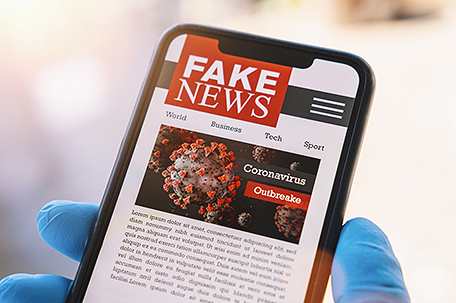
By Stephanie Humphrey

According to a statistic by Scientific American, the United States houses 4 percent of the world’s population, but accounts for 22% of global COVID-19 deaths.
Many experts agree that the level of misinformation circulated during this pandemic has been unprecedented, and that incorrect information plays a large part in people not following public health recommendations, as well as widespread vaccine avoidance.
But even before we’d spent the past 18 months and counting fighting COVID-19 misinformation, the internet had always been a hotbed of conspiracy theories and fake news. So where can you go online to get the truth?
When in doubt, check out these websites to verify what you read on the internet.

Snopes.com has been fact checking stories on the internet for almost 25 years. They check news stories, verify whether politicians are telling the truth or not, debunk conspiracy theories, and they can tell you whether that post you saw on Facebook is a hoax.
You can also send them questions if you don’t find what you’re looking for on the site.
There are lots of other websites on the internet that you can use to fact-check, but Snopes.com is a one-stop shop for verifying everything from the latest news stories to everyday urban legends.

FactCheck.org is a nonpartisan, nonprofit project founded in 2003 by the Annenberg Public Policy Center at the University of Pennsylvania. They are primarily tasked to be a ‘consumer advocate’ for voters that aims to reduce the level of deception and confusion in U.S. politics.
But they also have an area of the website called SciCheck devoted to debunking misleading scientific claims meant to negatively influence the public as well. There is a page dedicated specifically to viral internet rumors, and you can also submit a question to the team. The project is working closely with Facebook to help identify and label viral fake news stories on that platform.

Now, if you’re browsing the web and aren’t sure whether what you’re reading is true or not, consider these tips:
Consider the source – There are A LOT of fake news websites that are intended to trick you into thinking they’re the real thing. For example, you might think you’re reading a story on cnn.com, but when you look more closely at the URL, it’s actually cnn.co.
It’s only the difference of one letter, but it makes a huge difference in the validity of the information you’ll get from the site. Always check the web address, and make sure the site isn’t meant to be a satirical news site either.
Check the date – A lot of websites try to mislead you by posting stories of events that happened a long time ago and tying them to current events. You might see a story about a riot from years ago being tied to a Black Lives Matter protest that happened last week to make it seem like there was more chaos, violence, and damage than there really was.
Also – check the photos that are run with news stories. There are tons of instances where the photo placed with a story has absolutely no connection whatsoever to the story itself. If you can’t verify the photo with one of the sources above, you can always do a reverse image search on Google.
Read past the headline – This is a particularly sore spot for me! I can’t tell you how many times friends shared news stories when it was obvious they hadn’t read past the headline. Even if you only get a few sentences in, that will typically tell you whether the headline was just clickbait and is unrelated to the actual story. Check out other stories on the website, too.
If you’re reading an article about the coronavirus, but there’s another story somewhere else about an Elvis sighting, that website is probably not the most reliable source. Finally, check the author of the news story as well. If there isn’t an author listed, that’s even more of a sign to be skeptical.
We’ve come to a point in our current culture where misinformation is literally killing people. Please use these tools to verify information before you share it – someone’s life could depend on it.
Stephanie Humphrey is a former engineer turned tech-life expert and author. She is a contributor to “Good Morning America” and Fox 29’s “Good Day Philadelphia.” You can find Stephanie all around the web @TechLifeSteph and get her book “Don’t Let Your Digital Footprint Kick You in the Butt!” on Amazon.

















Leave a Comment